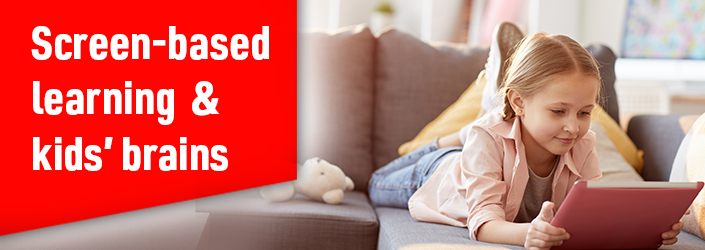Screen-based online learning will change kids’ brains. Are we ready for that?

Maryanne Wolf is the Director at the ‘Center for dyslexia, diverse learners and social justice, UCLA’.
In her new book – Reader, Come Home – Maryanne draws on neuroscience, literature, education, technology, and philosophy and blends historical, literary, and scientific facts with down-to-earth examples and warm anecdotes to illuminate complex ideas that culminate in a proposal for a ‘biliterate’ reading brain.
She warns that we are starting to see technology’s effect on child development and adult reading skills – and the research isn’t optimistic.
As seen in the recent pandemic, with much of the world working from home, and millions of students learning at home, developing a biliterate brain – one adapted to both digital and traditional print literacy – has never been more important.
Where reading the print medium allows for slower, more attention and time processes, the digital medium advantages fast processes and multitasking – ideal for the skimming of daily information.
Maryanne asks if youth will ever develop full literacy if they are learning on skim-encouraging screens.
Research suggests that over 80% of college educators have seen a ‘shallowing’ effect on reading comprehension by students.
The screen itself is not the problem. The distractions available on the screen lead to what researcher Linda Stone has called continuous partial attention. That in turn leads to less time allocated to abstract thought. The more time on screens, the more entrenched are associations to quick, superficial information-gathering and constant checks for new (distracting) information. The latter is the “novelty reflex”, rooted in our genes.
The great challenge now is to learn how to use both print and digital mediums to their best advantage for all.
“As a society we must ensure that there are always books next to our children’s digital devices. Whether the books are new or old, owned or borrowed from the library, doesn’t matter. What matters is that they are there, and that children are encouraged to read them. Furthermore, books – not digital devices – should be the only reading option in children’s bedrooms.”
Books are the places where we can suspend reality and instead explore our imagination’s more tolerable, more beautiful promise of possibility.
Maryanne concludes it is up to us to make this happen.
Sources:
https://www.maryannewolf.com/reader-come-home-1
https://www.theguardian.com/commentisfree/2020/aug/24/deep-literacy-technology-child-development-reading-skills

